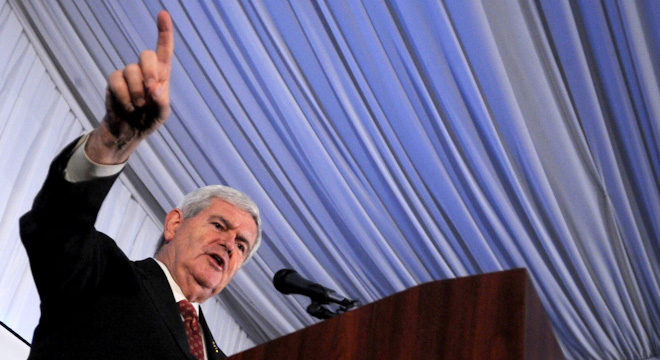Former House Speaker Newt Gingrich is the frontrunner in Iowa, despite having next to no campaign organization there. His strength in the state — and elsewhere — seems largely based on the enthusiasm generated from his combative debate performances.
But while there’s been evidence that Gingrich’s lead is a bit stronger than other previous flash-in-the-pan frontrunners, because he challenges former Mass. Gov. Mitt Romney on the key question of electability, he’s still the latest love of a fickle GOP electorate. And new polling data suggests that the race will continue to shift even though Newt stands to do better than the previous flavors of the month.
A University of Iowa poll shows the first concrete evidence that Newt isn’t going to simply walk away with the state, even though he’s very much in the lead and actual votes are going to take place in only a few weeks. In a small sample size of the likely Republican attendees of the January 3rd caucuses, Gingrich was still the first choice of nearly 30 percent. Romney was about ten points behind at 20.3. But Hawkeye pollsters were quick to point out that Gingrich had lost some ground from their previous poll, and some of that support had gone to a mix of the other non-Romney candidates.
Frederick Boehmke, associate professor of political science in the UI College of Liberal Arts and Sciences and faculty adviser of the Hawkeye Poll, says that although Gingrich is currently in the lead, he may be losing support.
“Gingrich’s 29.8 percent share among likely GOP caucus-goers still gives him a nine-point lead over Romney, but our results show that his support may be starting to slide as it has with previous frontrunners,” Boehmke says. “The gap has closed to 5.1 percentage points even though Romney’s support has changed very little.”
Gingrich’s lead over Romney is smaller among “very likely” caucus-goers, with 29.0 percent stating they would vote for him if the caucuses were held today compared to 22.6 percent who identified Romney as their preferred candidate. This gap widened among those “somewhat likely” to attend the caucuses, with 31.2 percent supporting Gingrich and 16 percent supporting Romney if the caucuses were held today. Among “very likely” caucus-goers, Bachmann placed third with 11.2 percent of respondents.
Public Policy Polling (D), which is polling state Republicans frequently ahead of the first caucuses, confirmed the trend in a big way. Gingrich fell off in their Iowa poll out Tuesday afternoon, showing Newt with only one point of breathing space between himself and Rep. Ron Paul (R-TX) at 22 – 21. Romney came in third at 16 percent, with Rep. Michele Bachmann (R-MN) at 11.
“Newt Gingrich’s momentum is fading in Iowa,” said Dean Debnam, President of Public
Policy Polling said in a release. “Meanwhile Ron Paul is building an unusual coalition of support for a Republican primary. The big question is: will they really turn out?”
The drop, PPP pollsters found, was about Newt himself. Gingrich’s favorability rating went down 19 points in a week, and Paul increased his favorability to an impressive 61 – 31 split among likely GOP caucus-goers. Essentially, Gingrich and Paul have switched their favorability postions in the last week, and it’s led to the neck-and-neck position that PPP now shows in their polling.
Gingrich had been in the high-twenties to low-thirties in surveys of Iowa since the middle of November, so the drop PPP found is significant. But New Hampshire pollster American Research Group found the same thing on Monday, and a quick rise followed by a drop has been the common trend in the GOP race so far.
Of course, any confirmed dip in the polls would only exacerbate organizational challenges the Gingrich campaign may have — Newt’s nearly non-existent political operation in the state has been well documented. Clearly, should Newt drop in the last few weeks, Iowa truly becomes a free for all. And with candidates like Ron Paul (R-TX), Michele Bachmann (R-MN) and Texas Gov. Rick Perry spending considerable time and resources in the state, votes could start moving as fast as they have during the process.
The main kicker, as Dr. Lee Miringoff, director of the Marist Institute for Public Opinion at Marist College told TPM in an interview last week, is how Romney finishes. Miringoff pointed to the old adage that the plan for candidates is to get one of the “three tickets out of Iowa,” — meaning that the top three finishers will be considered the real contenders for the nomination going further in the primary process. Newt may experience some turbulence over the next few weeks, but he’ll likely finish in that top three. But if Romney is edged out by another combination of candidates, “New Hampshire becomes a different climate,” said Miringoff.









